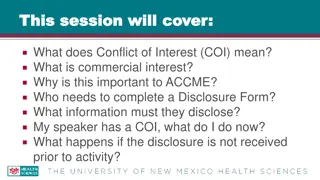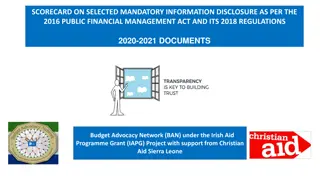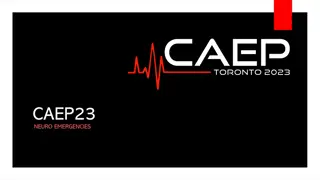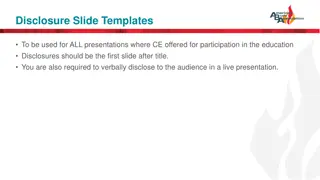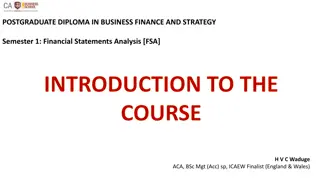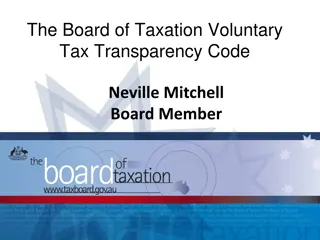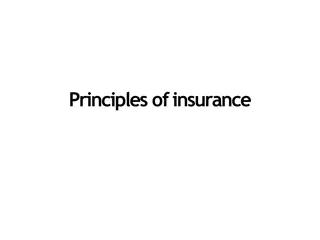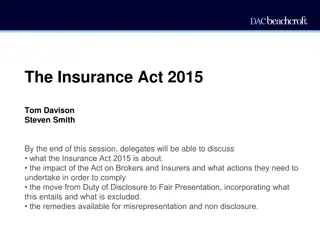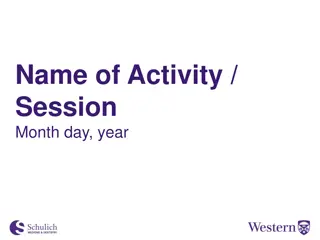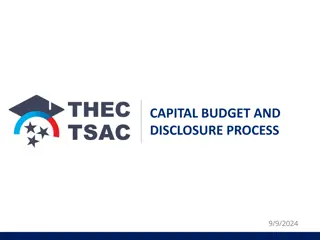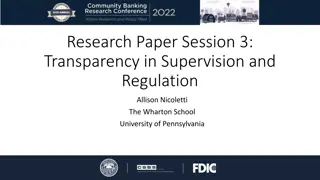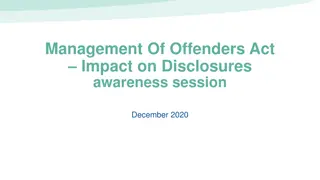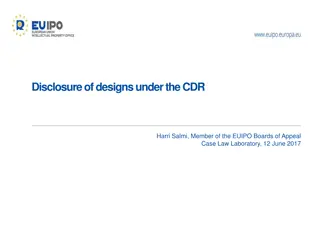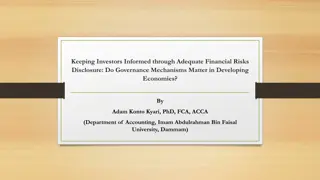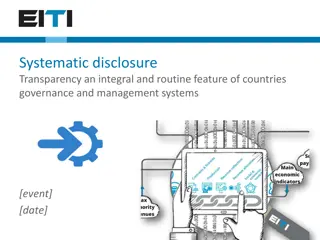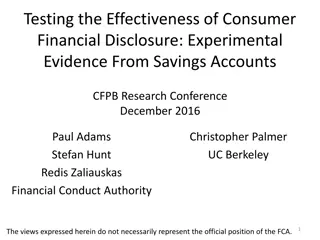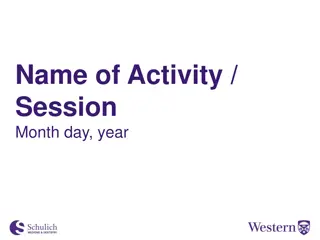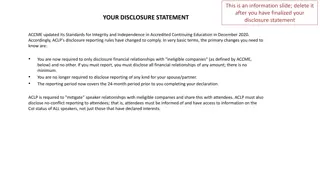Understanding Financial Disclosure and Lifestyle Audits Frameworks
The financial disclosure framework was introduced in 2016 by the Minister for the Public Service and Administration to manage conflict of interest situations in the public service. Designated employees disclose their financial interests annually via the eDisclosure system, and these disclosures are
2 views • 11 slides
Understanding Financial Leverage and Its Implications
Financial leverage refers to a firm's ability to use fixed financial costs to amplify the impact of changes in earnings before interest and tax on its earnings per share. It involves concepts like EBIT, EBT, preference dividends, and tax rates, and can be measured through the degree of financial lev
1 views • 7 slides
Understanding Conflict of Interest in ACCME Accredited Activities
Conflict of Interest (COI) refers to financial relationships that may create biases in Continuing Medical Education (CME) activities when individuals have ties to commercial interests and can influence the content. ACCME requires disclosure to prevent potential bias in CME content. Non-disclosure ca
0 views • 18 slides
Federal Agencies Guidance on Ethics, Compliance, and Audit Services under NSPM-33
The White House OSTP released guidance for federal agencies to implement NSPM-33 focusing on disclosure requirements, digital identifiers, consequences for violations, information sharing, and research security programs. The guidance emphasizes supporting open scientific inquiry and nondiscriminator
0 views • 10 slides
Scorecard on Mandatory Information Disclosure under 2016 Public Financial Management Act
The Scorecard on Mandatory Information Disclosure analyzes compliance with the 2016 Public Financial Management Act in Sierra Leone. The report shows that 23% of required documents are not produced, 24% of produced documents are not published, and highlights key findings to improve transparency and
0 views • 15 slides
Albanian National Financial Education Strategy 2022-2027
The Albanian National Financial Education Strategy (NFES) aims to promote financial education for individuals, households, and MSMEs to enhance financial well-being and economic stability. It focuses on key interventions, foundational enablers, institutional coordination, funding, and monitoring. Fi
0 views • 19 slides
Managing Neuro Emergencies: Faculty Disclosure and Financial Support
This presentation focuses on neuro emergencies with insights from faculty disclosure of financial relationships with sponsors and organizations. It also highlights financial support received and the mitigation of potential bias in the content.
0 views • 10 slides
Comprehensive Disclosure Guidelines for CE Presentations
Ensure proper disclosure in CE presentations by using the provided templates for financial relationships, conflicts of interests, and off-label medication discussions. These guidelines cover disclosing ineligible companies, nature of financial relationships, and off-label medication use. Adhere to t
4 views • 4 slides
Understanding Financial Statements Analysis in Business Finance
Understanding the analysis of financial statements is crucial for assessing the financial performance and position of an organization. This course provides knowledge, competencies, and skills necessary to apply basic financial statement analysis techniques, interpret financial numbers, and generate
0 views • 18 slides
The Board of Taxation Voluntary Tax Transparency Code Overview
The Board of Taxation developed a voluntary Tax Transparency Code to address community concerns and promote greater tax transparency among large businesses. The Code outlines recommended disclosures for both large and medium businesses, encouraging adoption of higher disclosure standards. Internatio
0 views • 20 slides
Key Principles of Insurance
Understanding insurable interest, utmost good faith, and material facts disclosure are essential principles in the insurance industry. Insurable interest requires a financial stake in the insured property, utmost good faith mandates honesty in the contract, and material facts disclosure ensures all
0 views • 22 slides
Understanding Related Party Transactions in Corporate Governance
Related Party Transactions (RPT) are vital in today's business world, ensuring transparency and disclosure in transactions involving parties related to the company. This article explores the significance of RPT, definitions under CA 2013 and SEBI LODR 2015, as well as the identification criteria as
0 views • 30 slides
Understanding the Impact of the Insurance Act 2015 on Brokers and Insurers
The Insurance Act 2015 brings significant changes in insurance contract law, shifting from Duty of Disclosure to Fair Presentation. This Act influences both Brokers and Insurers, requiring clear and accessible disclosure of material circumstances. The remedies for misrepresentation and non-disclosur
0 views • 19 slides
Updated Disclosure Rules for Financial Relationships in Continuing Education
ACCME updated its Standards for Integrity and Independence in Continuing Education, requiring disclosure of financial relationships with specific "ineligible companies" by all involved parties. The rules aim to enhance transparency and mitigate conflicts of interest in accredited continuing educatio
1 views • 5 slides
Understanding Disability Disclosure in Employment: Practical and Ethical Considerations
This presentation touches on the practical and ethical issues supported employment professionals face when dealing with disability disclosure. The agenda includes ADA provisions, successful disclosure strategies, the professional's role in the process, and available resources. The session covers dis
0 views • 33 slides
Understanding Disclosure of Adverse Clinical Events in Healthcare
Exploring the essential elements of disclosing adverse clinical events to patients and families in healthcare settings. It covers why disclosure is crucial, barriers to disclosure, triggers for disclosure, policies and procedures, and the other important aspects related to the disclosure process.
0 views • 8 slides
Sample Slide Format for COI Disclosure at Academic Meetings
This presentation provides a sample slide format for disclosing conflicts of interest (COI) at academic meetings. It includes guidelines for using Form 1-A when no conflicts exist and for using Form 1-A when conflicts need to be disclosed. The format also covers details about financial interests and
0 views • 5 slides
Event Disclosure and Learning Objectives Overview
This document provides important information on financial support disclosure, conflicts of interest disclosures, and methods to mitigate potential bias within a program or session. It also outlines the overall learning objectives for participants, as well as session-specific learning objectives.
0 views • 8 slides
Effective Presentation Strategies for Engaging Audiences
Crafting impactful presentation slides is crucial for engaging audiences. This sample presentation template showcases the use of headlines, financial disclosure slides, and color schemes to enhance visual appeal and convey information effectively. Including disclosure statements and using varying fo
0 views • 5 slides
Understanding the Capital Budgeting and Disclosure Process
This content provides a comprehensive overview of the capital budgeting and disclosure process, focusing on fiscal years, budget terms, and the sequential steps involved in the capital budget process. It explains the timeline from the Governor's capital budget release to the final approval by the go
2 views • 23 slides
Example of COI Disclosure Formats in Academic Presentations
These images provide examples of Conflict of Interest (COI) disclosure formats for oral and poster presentations in academic settings. They outline how authors can disclose any potential COIs in relation to their work over the past three years, including details on employment, stock ownership, paten
1 views • 4 slides
Detailed Guidance and Requirements for Implementing NSPM-33
The update provides detailed guidance on implementing NSPM-33's disclosure requirements and other provisions discussed in the January 2022 CLASP Meeting. It includes areas such as disclosure requirements, digital persistent identifiers, consequences for violations, information sharing, and research
1 views • 19 slides
Transparency in Banking: Examining Disclosure and Regulation
Discussion on the importance of transparency in the banking industry, focusing on the level of information disclosure by banks and its impact on market discipline, lending practices, and regulatory intervention. Papers explore different facets of transparency, including the disclosure audience, natu
0 views • 10 slides
Evolution of Vulnerability Disclosure Practices
The history of vulnerability disclosure, from the early days of mailing lists and zines to the emergence of Full Disclosure and the debates around anti-disclosure groups. The timeline covers key events like the Morris worm, Code Red, the founding of Bugcrowd, and more, illustrating the evolution of
0 views • 11 slides
Impact of Management of Offenders Act on Disclosure Awareness Session
On 30 November 2020, new legislation including the Age of Criminal Responsibility (Scotland) Act 2019 and the Management of Offenders (Scotland) Act 2019 came into force, transforming the disclosure system in Scotland. These changes raise the age of criminal responsibility, reduce rehabilitation per
0 views • 10 slides
Understanding the Importance of 278-T Reports in Public Financial Disclosure
Explore why periodic transaction reports like the 278-T are essential for OGE 278 filers under the STOCK Act, detailing required transactions, exemptions, optional reporting scenarios, and obligations for termination filers and new entrants. Keeping your disclosure flier list up-to-date is crucial t
1 views • 14 slides
Understanding Disclosure of Designs under CDR - Key Insights
The article explores the disclosure of designs under the Community Design Regulation (CDR) and Community Design Invalidity Regulation (CDIR). It discusses the criteria for public availability, evidence required for proving prior disclosure, and the basic rules for establishing the disclosure of a pr
0 views • 9 slides
Financial Literacy Empowerment in Eastern and Southern Africa
Developing countries in Eastern and Southern Africa are prioritizing financial education to empower consumers in making sound financial decisions. Financial literacy enhances financial inclusion, stability, and economic growth. It involves awareness, knowledge, skills, attitudes, and behaviors essen
0 views • 23 slides
Financial Disclosure Guidelines for Investment Funds
Explore key aspects of financial disclosure for investment funds, including requirements for excepted investment funds, conflicts analysis, and valuation of stock options. Learn about exemptions, reporting obligations, and considerations for unvested options in this comprehensive guide.
0 views • 21 slides
Gamifying Vulnerability Reporting for Coordinated Disclosure at Microsoft Security Response Center
Christa Anderson, a Senior Security Program Manager at Microsoft's Security Response Center, discusses the importance of gamifying vulnerability report data to encourage coordinated disclosure. The MSRC Top 100, announced at Black Hat USA, plays a crucial role in the public credit strategy by recogn
0 views • 13 slides
Understanding Paternalism in Corporate Financial Disclosure
Regulatory paternalism in corporate financial disclosure can offer short-term benefits to investors but may lead to long-term harm. Jeremy Bertomeu's analysis explores the implications of applying parental metaphor to regulatory practices in corporate reporting. The balance between protecting invest
0 views • 15 slides
Financial Literacy and Education Commission: Coordinating Federal Efforts
Financial capability empowers individuals to manage financial resources effectively, make informed choices, avoid pitfalls, and improve their financial well-being. The Financial Literacy and Education Commission (FLEC) works to improve the financial literacy of individuals in the United States throu
0 views • 16 slides
Governance Mechanisms and Financial Risks Disclosure in Developing Economies
Examining the impact of governance mechanisms on financial risk disclosure in developing economies, this study delves into theories, literature reviews, findings, policy implications, and conclusions. The research emphasizes the importance of adequate risk disclosure for investor trust and regulator
0 views • 9 slides
The Use of Self in Probation Practice: Understanding Self-Disclosure and Its Implications
Explore the concept of self-disclosure in probation practice, examining different methods, findings, and implications. Discover the two schools of thought regarding self-disclosure and delve into the various realms and subtypes of self-disclosure practices. Gain insights into the forms of self-discl
0 views • 25 slides
Understanding Cultural Influence on Delayed Child Sexual Abuse Disclosure in the Vhavena Tribe
Exploring the intersection of culture, tradition, and delayed disclosure of child sexual abuse within the Vhavena Tribe. The study delves into the complexities of disclosure, the unique context of CSA in cultural norms, and behaviors, guided by the Afrocentric theory. Methodology involves interviews
0 views • 15 slides
Enhancing Governance through Systematic Disclosure and Transparency
Systematic disclosure and transparency play a crucial role in the governance and management systems of countries. This involves routine disclosure of information, such as financial data, to promote accountability and address gaps in information. The EITI Standard emphasizes the importance of mainstr
0 views • 23 slides
Conflict of Interest Disclosure for EAPC 2024 Congress
This disclosure statement outlines the conflict of interest policy for speakers at the EAPC 2024 Congress. Speakers are required to disclose any affiliations or financial interests that may potentially influence their presentations. The purpose of the disclosure is to inform attendees so they can ev
0 views • 4 slides
Testing Effectiveness of Consumer Financial Disclosure: Experimental Evidence
This study explores the impact of consumer financial disclosure on savings accounts, investigating the importance of design and presentation. It questions whether optimized disclosures can enhance consumer outcomes and delves into the challenges posed by consumer inertia. The UK savings market backg
0 views • 24 slides
Mitigating Bias and Disclosure of Financial Support in Educational Program
The educational program detailed in the content emphasizes the disclosure of financial support received and the mitigation of potential bias. Faculty members have provided disclosures regarding any financial interests or affiliations that could pose conflicts of interest. This ensures transparency a
0 views • 9 slides
New Disclosure Rules for Continuing Education
ACCME updated its Standards for Integrity and Independence in Accredited Continuing Education in December 2020, leading to changes in ACLP's disclosure reporting rules. Key changes include reporting only financial relationships with "ineligible companies," extending the reporting period to 24 months
0 views • 5 slides


